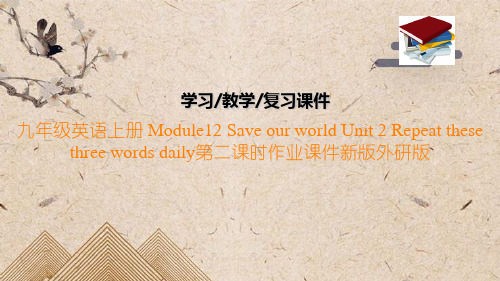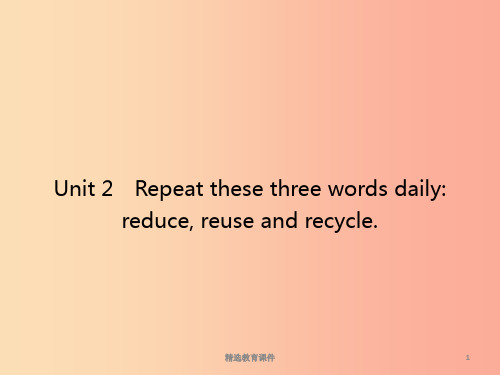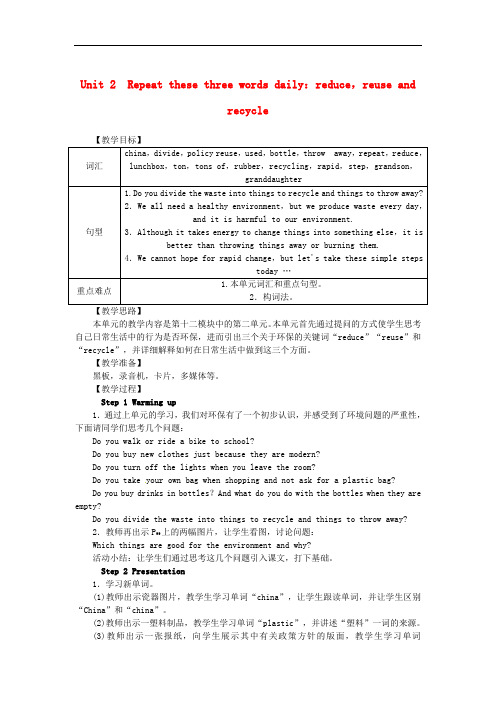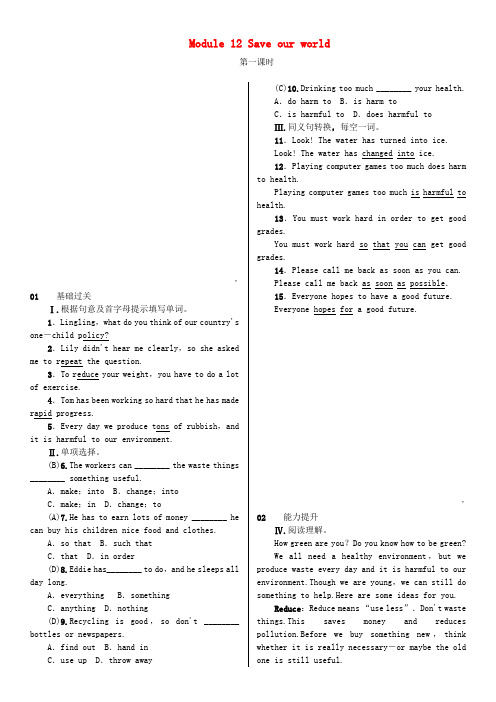2019秋九年级英语上册Module12SaveourworldUnit2Repeatthesethreewordsdailyreducereuseandrecycle教案311
九年级英语上册 Module12 Save our world Unit 2 Repeat

(三)根据句意及首字母提示补全以下单词。(5×3分=15分) 11.The elephant is often two to seven t_o_n_s___heavy. 12.With the help of Mr Liu , he has made r_a_p_i_d___progress in English. 13.We should take s_t_e_p_s__to protect the environment. 14.You'd better bring a c_lo_t_h___bag when you go to the supermarket. 15.It is better to use c_h_i_n_a__cups and bowls because they can be used many times.
学习/教学/复习课件
九年级英语上册 Module12 Save our world Unit 2 Repeat these three words daily第二课时作业课件world
Unit 2 Repeat these three words daily : reduce ,
(二)用括号内所给单词的适当形式填空。(5×2分=10分) 6.—Is Mr Jackson rich?
—Oh , yes.He's got___to_n_s___(ton) of money. 7.My pen friend often buys__p_r_o_d_u_c_ts__(product) made abroad. 8.—Ann , what did you__d_o_(do) with your old books? —I sold them. 9.Maria likes using cloth___b_a_g_s___(bag) instead of plastic ones. 10.It_t_a_k_e_s__(take) Lily thirty minutes to go to school on foot every day.
九年级英语上册Module12SaveourworldUnit2Repeatthesethreewo

A.throw away
B.to throw away
C.to clean up
D.picked up
精选教育课件
8
( C )7.(2017·合肥庐阳中学月考)You will ________ what
kind of a person he is one day.(导学号:34094104)
A.find
精选教育课件
10
4.这个谷仓能存放数吨粮食。 The barn can store ___to_n__s__ ___o_f____ grain. 5.我们必须采取措施保持土壤。 We must ___t_a_k_e__ __s_t_e_p_s__ to keep the soil in place. 6.明天我们打算去爬山。我们希望有个好天气。 We're going to climb the mountain tomorrow. We __h_o_p_e___ ____fo_r___ good weather.
6.Such a __p_o_li_c_y__ (政策) is difficult, not impossible.
精选教育课件
3
Ⅱ.用方框中所给单词的适当形式填空。 necessary, use, repair, material, fashion, bottle 1.I like “real __m_a_t_e_r_ia_l_s__” like wool, wood and stone. 2.Glass water _b_o_t_tl_e_s__ can be recycled over and over. 3.Don't throw away the boxes. They can be _r_e_u_s_e_d__.
Module12SaveourworldUnit2读写课教案

学生小组讨论环节,大家在围绕环保行动在实际生活中的应用展开讨论时,提出了许多有趣的观点。作为引导者,我尽量提出一些开放性的问题,激发学生们的思考。但从讨论过程来看,部分学生在提出观点时,还需要加强逻辑性和条理性。在今后的教学中,我会继续引导学生进行深入思考,提高他们的逻辑表达能力。
-口语互动:部分学生可能羞于开口,或不知如何在小组讨论中有效地参与和贡献自己的观点。
举例:
-为了克服词汇记忆难点,可以设计词汇卡片游戏,通过重复和趣味性增强记忆。
-在写作环节,难点在于如何引导学生将零散的观点组织成一篇结构严谨的议论文。可以通过分析范文、提供写作框架等方法帮助学生突破这一难点。
-口语互动时,教师可以设计角色扮演活动,给予学生明确的角色和话题,降低开口难度,鼓励学生参与讨论。
五、教学反思
在今天的教学过程中,我发现学生们对环保话题表现出了浓厚的兴趣,这让我感到非常欣慰。在导入新课环节,通过提问的方式,成功引起了学生们的思考和好奇心。他们在回答问题时,提出了很多有见地的观点,这说明学生们在日常生活中已经具备了一定的环保意识。
在新课讲授环节,我发现理论介绍部分,学生们对环保的基本概念掌握得相对较好。但在案例分析部分,有些学生对具体的环保行动在实际中的应用还显得有些迷茫。因此,在接下来的教学中,我需要更加注重案例分析,让学生们了解环保行动的具体实施方法。
-针对口语表达中的难点,可以设置小组讨论的引导性问题,确保每位学生都有机会发表意见。
九年级英语上册 Module 12 Save our world Unit 2 Repeat the

Unit 2 Repeat these three words daily:reduce,reuse andrecycle本单元的教学内容是第十二模块中的第二单元。
本单元首先通过提问的方式使学生思考自己日常生活中的行为是否环保,进而引出三个关于环保的关键词“reduce”“reuse”和“recycle”,并详细解释如何在日常生活中做到这三个方面。
【教学准备】黑板,录音机,卡片,多媒体等。
【教学过程】Step 1 Warming up1.通过上单元的学习,我们对环保有了一个初步认识,并感受到了环境问题的严重性,下面请同学们思考几个问题:Do you walk or ride a bike to school?Do you buy new clothes just because they are modern?Do you turn off the lights when you leave the room?Do you take your own bag when shopping and not ask for a plastic bag?Do you buy drinks in bottles?And what do you do with the bottles when they are empty?Do you divide the waste into things to recycle and things to throw away?2.教师再出示P99上的两幅图片,让学生看图,讨论问题:Which things are good for the environment and why?活动小结:让学生们通过思考这几个问题引入课文,打下基础。
Step 2 Presentation1.学习新单词。
(1)教师出示瓷器图片,教学生学习单词“china”,让学生跟读单词,并让学生区别“China”和“china”。
九年级英语上册 Module 12 Save our world Unit 2 Repeat the

Module 12 Save our world第一课时,01基础过关Ⅰ.根据句意及首字母提示填写单词。
1.Lingling,what do you think of our country's one-child policy?2.Lily didn't hear me clearly,so she asked me to repeat the question.3.To reduce your weight,you have to do a lot of exercise.4.Tom has been working so hard that he has made rapid progress.5.Every day we produce tons of rubbish,and it is harmful to our environment.Ⅱ.单项选择。
(B)6.The workers can ________ the waste things ________ something useful.A.make;into B.change;intoC.make;in D.change;to(A)7.He has to earn lots of money ________ he can buy his children nice food and clothes.A.so that B.such thatC.that D.in order(D)8.Eddie has________ to do,and he sleeps all day long.A.everything B.somethingC.anything D.nothing(D)9.Recycling is good,so don't ________ bottles or newspapers.A.find out B.hand inC.use up D.throw away(C)10.Drinking too much ________ your health.A.do harm to B.is harm toC.is harmful to D.does harmful toⅢ.同义句转换,每空一词。
- 1、下载文档前请自行甄别文档内容的完整性,平台不提供额外的编辑、内容补充、找答案等附加服务。
- 2、"仅部分预览"的文档,不可在线预览部分如存在完整性等问题,可反馈申请退款(可完整预览的文档不适用该条件!)。
- 3、如文档侵犯您的权益,请联系客服反馈,我们会尽快为您处理(人工客服工作时间:9:00-18:30)。
Unit 2 Repeat these three words daily:reduce,reuse andrecycle本单元的教学内容是第十二模块中的第二单元。
本单元首先通过提问的方式使学生思考自己日常生活中的行为是否环保,进而引出三个关于环保的关键词“reduce”“reuse”和“recycle”,并详细解释如何在日常生活中做到这三个方面。
【教学准备】黑板,录音机,卡片,多媒体等。
【教学过程】Step 1 Warming up1.通过上单元的学习,我们对环保有了一个初步认识,并感受到了环境问题的严重性,下面请同学们思考几个问题:Do you walk or ride a bike to school?Do you buy new clothes just because they are modern?Do you turn off the lights when you leave the room?Do you take your own bag when shopping and not ask for a plastic bag?Do you buy drinks in bottles?And what do you do with the bottles when they are empty?Do you divide the waste into things to recycle and things to throw away?2.教师再出示P99上的两幅图片,让学生看图,讨论问题:Which things are good for the environment and why?活动小结:让学生们通过思考这几个问题引入课文,打下基础。
Step 2 Presentation1.学习新单词。
(1)教师出示瓷器图片,教学生学习单词“china”,让学生跟读单词,并让学生区别“China”和“china”。
(2)教师出示一塑料制品,教学生学习单词“plastic”,并讲述“塑料”一词的来源。
(3)教师出示一张报纸,向学生展示其中有关政策方针的版面,教学生学习单词“policy”。
(4)教师将一个木板放在相邻的两个学生中间,教学生学习单词“divide”,并引出“divide … into …”。
(5)教师展示一个一次性纸杯和一个玻璃瓶,教学生学习单词“bottle”和“reuse”。
(6)教师拿出自己的手机,教学生学习单词“used”。
(7)教师将一个废纸团扔进垃圾篓,教学生学习短语“throw away”。
(8)教师由单词“kilogram”引出新单词“ton”以及短语“tons of”。
(9)教师展示橡胶树和轮胎的图片,教学生学习单词“rubber”。
(10)教师由单词“fast”和“quick”引出新单词“rapid”,并讲解三者之间的区别。
(11)教师展示植树过程的图片,教授新单词“step”和短语“take steps”。
(12)教师展示一张某家庭的家谱,教学生学习新单词“grandson”和“granddaughter”,并复习其他家庭成员的称呼。
2.操练单词。
(1)给学生几分钟记单词,然后教师把带有单词的卡片拿出来让学生依次拼读。
(2)教师可以把学生分成几组进行单词拼读比赛。
活动小结:教师以图片的形式导入新单词,以图记忆单词,找几名学生比赛记单词,提高效率,巩固记忆。
Step 3 Reading & Practice1.Let students listen to the reading and pay attention to the words' pronunciation and intonation.(1)教师播放阅读部分的录音,让学生仔细听录音,注意重要单词的语音和语调。
(2)对于比较长的句子,让学生多听几遍,注意长句子的断句和连读,让学生跟读几遍。
(3)教师播放录音的时候,注意是一句一句地播放,让学生试着跟读。
(4)听读完阅读文章,让学生完成Activity 2,让学生来试着分组讨论答案,师生一起核对答案。
学生可能出现的讨论结果:(1)We should try to walk to school because it can reduce pollution.(2)We should open the window instead of turning on the air conditioning so that we can save energy.(3)We should not buy clothes just because they are the latest fashion because it may waste money.…活动小结:让学生多听、多跟读,加强语感、语速,培养语流、语调,提高阅读理解能力。
2.Let the students translate the passage.(1)首先让学生自主细读全文,把握内容与结构,具体步骤:①先把每段读懂,每段读完能概括出其大意,确保一段读懂再继续看下一段,此步骤可帮助学生了解每段内容,这样做题时找答案可以迅速找到位置;②了解每段意思后,再看全文,深入了解段与段之间内容的联系,把握全文的结构,从整体上更好地理解全文。
(2)教师让学生四人为一组,给几分钟的时间,让学生以组为单位来读文章并对文章进行逐句翻译,确定每句的最佳翻译。
3.Language points在学生翻译文章的同时,让学生找出文中的重点短语和句型。
教师把本单元的重点短语和句型写在黑板上,带领学生一起学习。
4.对重点内容和疑难问题进行合作探究学习,自主完成后,小组合作,交流补充。
(1)Do you divide the waste into things to recycle and things to throw away?throw away意为__________,其后可接名词或代词作宾语,当宾语为代词时,代词必须位于副词away的__________。
例如:重新使用废弃物对我们的环境有好处,所以不要扔掉它们。
Reusing waste is good for our environment,so__________.(2)… and it is harmful to our enviro nment.句中be harmful to意为__________,其反义短语“对……有好处”可表达为__________。
例如:如果你伤害她,你将受到惩罚。
You'll be punished,_______________________________________________.自主造句:______________________________________________________.(3)Use things for as long as possible.as … as possible意为__________,有时可表达为“as … as sb can”,“as…as”中间为形容词或副词的__________级。
例如:当她听说那个消息的时候,她尽可能快地回家了。
When she heard of the news,__________.(4)It is better to use china cups and cloth bags because they can be used many times.It's+adj.+to do sth.的意思_________________________________________例如:学好英语是重要的。
__________________________________________自主造句:______________________________________________5.Complete Activities 4,5 and 6.活动小结:首先自主学习,锻炼学生独立思考的能力;以小组为单位翻译课文,既发挥小组合作精神,使学生为了小组的荣誉会更加细心、认真,又调动了他们的学习积极性。
逐句翻译,使学生能更深刻地理解课文。
Step 4 ConsolidationFinish the exercises.ReduceReduce means“use less”.Do not__1__things.It saves money and reduces__2__and waste going into the environment. Before we buy something__3__,think whether it is really necessary because maybe the old one will be just as good!When we do buy things,choose__4__products if possible,and try not to buy too many things from abroad.( )1.A. use B. waste C.buy D. make( )2.A. pollution B.population C. products D.progress( )3.A. beautiful B. colourful C. old D.new( )4.A. cheap B. expensive C. local D.abroadReuseReuse means“use again”.Use things for as__5__as possible. When we buy things,make sure that they__6__a long time. We should look after them so that they will last,and we should __7__them if it is not necessary to throw them away and buy new ones.Don't use a paper cup or a paper bag.It's better to use a chi na cup and alunchbox__8__you can use them again.( )5.A. long B. short C.much D.little( )6.A. make B. stay C.take D. last( )7.A.buy B.sell C. repair D.make( )8.A because B. so C. if D.when活动小结:通过学习重点句型,提炼知识点,让学生能简单明了地认识知识点,从而更加牢固地掌握。
